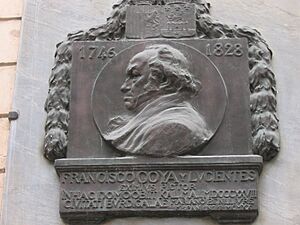Afrancesado facts for kids
The term Afrancesado (pronounced ah-fran-seh-SAH-doh) means "Frenchified" or "French-alike." It was used to describe people in Spain and Portugal who supported new ideas from the Age of Enlightenment, Liberalism, or the French Revolution.
These people, often from the upper and middle classes, supported the French when they occupied Spain and Portugal. They preferred the changes brought by leaders like Napoleon I and his brother Joseph Bonaparte, who became king of Spain. They saw these changes as a way to improve their countries, or at least to avoid a terrible war with France, which was Europe's strongest military power at the time.
Contents
Spain
How the Term Started
In Spain, the word afrancesado first appeared during the rule of Charles III of Spain. Back then, it simply meant someone who liked French fashion and customs. It wasn't a bad word.
Later, it became a negative term. It was used for Spanish nobles and government officials who promised loyalty to Joseph Bonaparte. He was made king of Spain by his brother, Napoleon. The term also included thinkers, merchants, and manufacturers from the middle class. They saw the French as bringing important changes to Spain's old society. They were tired of the corruption and poor leadership of Charles IV of Spain and the royal family.
Their Political Goals
King Joseph Bonaparte found himself at war with most of the Spanish people. He relied on the afrancesados to help him change Spain. They wanted to replace old traditions and absolute rule with a system based on "reason, justice, and power."
These changes were progressive but not fully liberal. Soon, both conservatives (who liked the old ways) and liberals (who wanted more freedom) rejected Joseph's rule. Many liberals even joined the guerrilla fighters against the French. The afrancesados also worried about Napoleon's plans for Spain. They wanted Spain to stay out of the Napoleonic Wars. They even tried to stop Napoleon from taking over parts of Spain like Catalonia and Aragon.
Later, the afrancesados tried to work with the Spanish government that was fighting the French, called the Cortes of Cádiz. They hoped to keep some of Joseph's laws in the new Spanish Constitution of 1812. However, the Cortes decided to take away all the property of Joseph's court and the afrancesados.
Life in Exile
After a major battle in 1813, Joseph's court and his supporters had to flee to France with the French armies. This included nobles, soldiers, lawyers, writers, journalists, and even priests. Between 4,000 and 12,000 people went into exile.
When Ferdinand VII of Spain returned to power, he broke his promise to Napoleon. He started to persecute many people. He called anyone who hadn't fought against the French an afrancesado. This included people who worked for the French, received honors from King Joseph, or kept their jobs during the occupation.
The large number of these Spanish exiles worried the French government. They asked the Spanish government to forgive them. During a period called the Liberal Triennium, an amnesty (official pardon) was given. However, those who returned often had to flee again later. In 1832, France told them they needed to either settle in France or leave the country.
Famous Spanish Afrancesados
- Francisco Amorós
- Miguel José de Azanza, Duke of Santa Fe
- Fernando Sor
- Javier de Burgos
- François Cabarrus
- Fernando Camborda
- José Antonio Conde
- Guido Bellico
- Leandro Fernández de Moratín
- José Mamerto Gómez Hermosilla
- Francisco Goya
- Alberto Lista y Aragón
- Juan Antonio Llorente
- José Marchena
- Francisco Martínez Marina
- Juan Meléndez Valdés
- Sebastián Miñano
- Manuel Narganes
- Martín Fernández de Navarrete
- Gonzalo O'Farrill
- Cipriano de Palafox, 8th Count of Montijo
- Manuel José Quintana
- Félix José Reinoso
- Mariano Luis de Urquijo
- Diego Fernández de Velasco, 13th Duke of Frías
- Juan Van Halen
- Francisco Antonio Zea
Portugal
In Portugal, the term afrancesado was used for liberal politicians. These were the people who started the Revolution of Porto on August 25, 1820. They wanted a system based on the rule of law instead of arbitrary rule. They also demanded that King John VI return from Brazil, where he had moved the Portuguese royal court during the French invasion.
French ideas had already influenced the Portuguese elite. They learned about concepts like the separation of powers (dividing government into different branches) and parliamentary rule (where elected representatives make laws). The afrancesados wanted these ideas to be put into practice in Portugal.
See also
 In Spanish: Afrancesado para niños
In Spanish: Afrancesado para niños
 | Isaac Myers |
 | D. Hamilton Jackson |
 | A. Philip Randolph |



